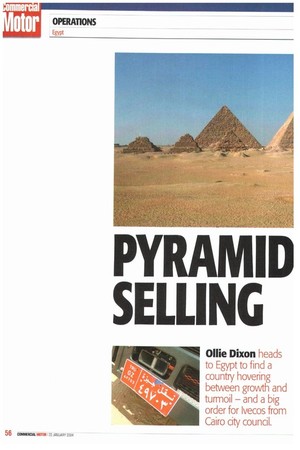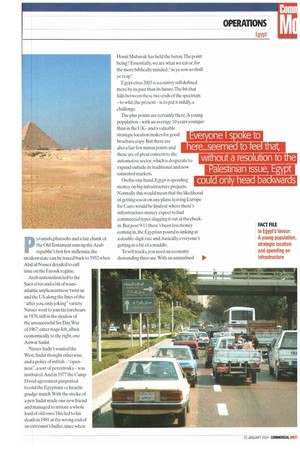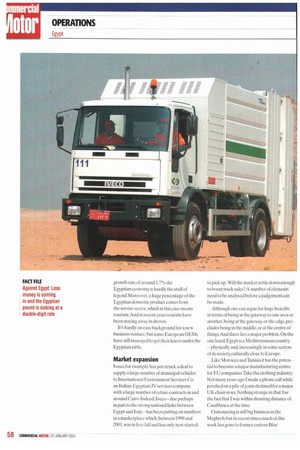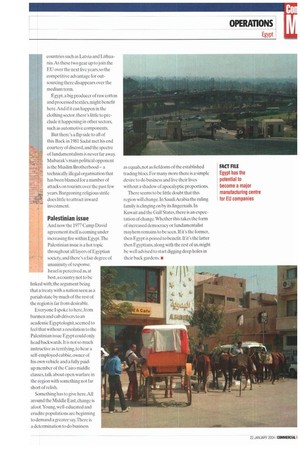PlititIVI SELLING
Page 56

Page 57

Page 58

Page 59

If you've noticed an error in this article please click here to report it so we can fix it.
011ie Dixon heads to Egypt to find a country hovering between growth and turmoil—and a big order for lvecos from Cairo city council.
pyramids, pharaohs and a fair chunk of the Old Testament sum up the Arab republic's first few millennia; the modem state can be traced back to 1952 when Abil al-Nasser decided to call time on the Farouk regime.
Arab nationalism led to the Suez crisis and a bit of transatlantic unpleasantness Iwixt us and the US along the lines of the "after you, only joking" variety. Nasser went to join his forebears in 1970,stillin the shadow of the unsuccessful Six Day War of 1967: enter stage left, albeit economically to the right, one Anwar Sadat.
Nasser hadn't wanted the West, Sadat thought otherwise, and a policy of infitah —"openness".a sort of perestroika — was instituted.And in 1977 the Camp David agreement purported to end the Egyptians vs Israelis grudge match. With the stroke of a pen Sadat made one new friend and managed to irritate a whole load of old ones.This led to his death in 1981 at the wrong end of an extremist's bullet,since when Hosni Mubarak has held the baton.The point being? Essentially, we are what we eat or. for the more biblically minded,-as ye sow so shall ye reap".
Egypt circa 2003 is a country still defined more by its past than its future.The bit that falls between these two ends of the spectrum —to whit, the present — is, to put it mildly, a challenge.
The plus points are certainly there. A young population— with an average 10 years younger than in the UK— and a valuable strategic location makes for good brochure copy. But there are also a fair few minus points and these are of great concern to the automotive sector, which is desperate to expand outside its traditional and now saturated markets. On the one hand, Egypt is spending mire onsminfiregMaci money on big infrastructure projects.
Normally this would mean that the likelihood of getting a seat on any plane leaving Europe for Cairo would be limited: where there's infrastructure money expect to find commercial types slugging it out at the checkin. But post 9/i1 there's been less money coming in, the Egyptian pound is sinking at a double-digit rate and. basically, everyone's getting in a bit of a muddle.
To sell trucks, you need an economy demanding their use. With an annualised PIP.
growth rate of around 1.7% the Egyptian economy is hardly the stuff of legend. Moreover, a huge percentage of the Egyptian domestic product comes from the service sector, which in this case means tourism.And in recent years tourists have been staying away in droves.
It's hardly an easy background fora new business venture, but some European OEMs have still managed to get their knees under the Egyptian table.
Market expansion Iveco, for example, has just struck a deal to supply a large number of municipal vehicles to International Environment Services Co, an Italian-Egyptian .11/ services company with a large number of refuse contracts in and around Cairo. Indeed, Iveco due perhaps in part to the strong national links between Egypt and Italy has been putting on numbers in a marketplace which, between 1999 and 2001, was in free fall and has only now started to pick up. Will the market settle down enough to boost truck sales? A number of elements need to be analysed before a judgement can be made.
Although one can argue for huge benefits in terms of being at the gateway to one area or another,being at the gateway, or the udge,preeludes being in the middle, or at the centre of things.And there lies a major problem. On the one hand, Egypt is a Mediterranean country physically and, increasingly in some sectors of its society, culturally close to Europe.
Like Morocco and Tunisia it has the potential to become a major manufacturing centre for EU companies.Take the clothing industry Not many years ago I made a phone call while perched on a pile of jeans destined for a major UK chain store. Nothing strange in that, bar the fact that! was within shouting distance of Casablanca at the time.
Outsourcing is still big business in the Maghreb, but in recent times much of this work has gone to former eastern Bloc
countries such as Latvia and Lithuania. As these two gear up to join the EU over the next five years,so the competitive advantage for outsourcing there disappears over the medium term.
Egypt, a big producer of raw cotton and processed textiles, might benefit here. And if it can happen in the clothing sector,there's little to preclude it happening in other sectors, such as automotive components.
But there's a hip side to all of this. Back in 1981 Sadat met his end courtesy of discord, and the spectre of fundamentalism is never far away. Mubarak's main political opponent is the Muslim Brotherhood— a technically illegal organisation that has been blamed bra number of attacks on tourists over the past few years. Burgeoning religious strife does little to attract inward investment.
Palestinian issue
And now the 1977 Camp David agreement itself is coming under increasing fire within Egypt.The Palestinian issue is a hot topic throughout all layers of Egyptian society,and there's a fair degree of unanimity of response. Israel is perceived as. at best, a country not to be linked with; the argument being that a treaty with a nation seen as a pariah state by much of the rest of the region is far from desirable.
Everyone I spoke to here, from barmen and cab drivers to an academic Egyptologist, seemed to feel that without a resolution to the Palestinian issue Egypt could only head backwards. It is not so much instructive as terrifying, to hear a self-employed cabbie, owner of his own vehicle and a fully paidup member of the Cairo middle classes, talk about open warfare in the region with something not far short of relish.
Something has to give here, All around the Middle East,change is afoot. Young, well-educated and erudite populations are beginning to demand a greater say.There is a determination to do business as equals, not as fiefdoms of the established trading blocs. For many more there is a simple desire to do business and live their lives without a shadow of apocalyptic proportions.
There seems to be little doubt that this region will change. In Saudi Arabia the ruling family is clinging on by its fingernails. In Kuwait and the Gulf States, there is an expectation of change.Whether this takes the form of increased democracy or fundamentalist mayhem remains to be seen. If it's the former, then Egypt is poised to benefit. If it's the latter then Egyptians, along with the rest of us, might be well advised to start digging deep holes in their back gardens. •




























































































































































































